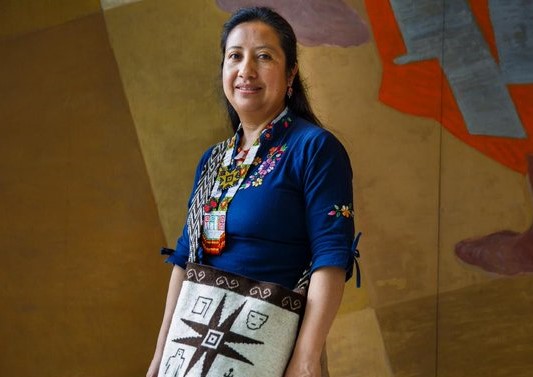To mark International Women’s Day 2023, the NEA Initiative hosts a conversation with Dr. Reia Guppy, chapter author for Grenada’s national ecosystem assessment, Edith Bastidas, indigenous representative and chapter lead author for Colombia’s national ecosystem assessment, and Dr. Oageng Disang, Project Coordinator in the Ministry for Botswana’s assessment, to reflect on the critical knowledge and roles of women in the management and use of biodiversity and ecosystem services.
Why is gender equality and women’s empowerment important to conservation?
Around the world, socially defined gender norms determine the roles and responsibilities that men and women have in their households and communities. These gender roles mean that men and women often have different uses, needs, and values regarding the natural environment. As a result, men and women often possess unique and complementary knowledge about biodiversity and ecosystem services.
Women’s relationships with the natural environment are varied and contextual, but a common occurrence around the world is the critical role that women play in sustainably managing natural resources to provide food, fuel, income, medicines, and materials – all of which contribute significantly to the wellbeing and resilience of households and communities. Dr. Oageng Disang, co-chair of Botswana’s national ecosystem assessment, tells us about the roles and dependencies of women in Botswana’s context: “women in Botswana depend a lot on biodiversity products to support their families. [They] harvest and sell biodiversity products to generate household income. Women possess rich and valuable knowledge on the biodiversity in their local environments, knowledge which has been accumulated over many years.”
Edith Bastidas, indigenous representative and lead author of the chapter on biocultural diversity in Colombia’s national ecosystem assessment, emphasises the unique knowledge, roles, and contributions of indigenous women: “in different cultures women have a definitive role in the preservation of knowledge and the territory, and therefore in the physical and cultural survival of the community. A woman in an indigenous community is an educator, a nurturer, a doctor, a healer, and guardian of the territory. Additionally, she has become an environmental leader. Indigenous women play a unique role as holders and transmitters of knowledge and participants in the collective memory of their communities.”
However, despite being key users of biodiversity and possessing critical knowledge that could help to solve complex environmental challenges, persistent gender inequalities mean that women are often excluded and under-represented in knowledge-sharing and decision-making spaces. As a consequence of their exclusion, conservation policies and plans often fail to account for the unique needs of women, and in some cases, risk exacerbating gender inequalities further. These inequalities are particularly prevalent for women who experience multiple intersecting forms of discrimination based on characteristics such as age, ethnicity, race, socio-economic status, class. For example, as Edith Bastidas explains, indigenous women are often more seriously impacted by the loss of biodiversity – which in turn impacts their ability to perform their roles in the community. Moreover, many indigenous women suffer from acute discrimination and violence.
Increasing women’s meaningful participation and leadership in knowledge-sharing and decision-making spaces is the only way to ensure that policies and plans regarding biodiversity account for the interests, needs, and perspectives of women. Gender-responsive policies can ensure that women are able to equally benefit from the sustainable use of biodiversity and fulfil their potential as environmental custodians. On the other hand, and as emphasised by Edith Bastidas, “the full consideration of the value of nature in decision-making could in turn not be achieved without the equal participation of women”.
How can national ecosystem assessments contribute to better understanding the unique uses and dependencies that men and women have in relation to biodiversity?
National ecosystem assessments draw on diverse forms of knowledge to develop an up-to-date, comprehensive and critical synthesis of knowledge on biodiversity and ecosystem services and their interlinkages to people. In synthesising this knowledge, national ecosystem assessments have the potential to uncover important information about the different values, needs, and benefits that men and women derive from biodiversity.
Assessment expert Dr. Reia Guppy describes how the participation of grassroots women in Grenada’s assessment revealed important insights about their roles as household providers and resource managers: “in Grenada, women form the workforce for the Titiree industry. Titiree is a type of goby larvae that’s found in rivers and is considered a national delicacy. Women harvest and sell these fish and use the income to pay for school fees, books and uniforms for their children for the year. Women tend to harvest the Titiree in specific family ‘spots’ along the river. The Titiree is an important source of income for these women and is of great cultural importance. This example tells us a lot about how the island’s riverine biodiversity and ecosystem services are managed and used by these women, and how this resource supports their households.”
How can national ecosystem assessments contribute to women’s empowerment in the context of knowledge-sharing and decision-making?
National ecosystem assessments aspire to be credible, legitimate and relevant by bringing together diverse stakeholders, including Indigenous Peoples and local communities, and working with different knowledge systems and disciplines to compile knowledge on biodiversity and ecosystem services and address specific policy questions to empower the full consideration of the value of nature in decision-making. Ensuring the meaningful and equitable participation of women in national ecosystem assessments, both as stakeholders and knowledge-holders, empowers women to contribute their knowledge and perspectives towards the development of a robust evidence base. By including women’s voices in knowledge-sharing and decision-making spaces, decision-makers are better equipped to develop policies that meet the needs and interests of all its citizens. As Dr. Oageng Disang explains, “such evidence could bring about policy shifts. Using this evidence, policies can be revised to better cater for women’s contributions to sustainable resource management and avoid gender-blind conservation measures”.
Conclusion
Women are important agents of transformational change in the global struggle to conserve biodiversity and ensure healthy, thriving communities. Hence, biodiversity conservation and gender equality are inextricably interlinked. However, significant effort is needed at all levels to ensure the fair and meaningful participation of women in knowledge-sharing and decision-making spaces. For this reason, the NEA Initiative, along with its consortium partners BES-Net and UNESCO, continue to ensure gender considerations are mainstreamed across all components of the project through implementation of the BES-Net Gender Strategy. As demonstrated by our country partners, national ecosystem assessments provide a significant opportunity to fill important knowledge gaps regarding the roles, needs, contributions, and values that women possess in relation to biodiversity. Only when decision-makers are equipped with this evidence can national policies simultaneously safeguard biodiversity and advance gender equality.
To learn more about our efforts to mainstreaming gender considerations, you can read our guidance document “Gender balance and women’s participation in national ecosystem assessments” and watch our webinar on the gender-biodiversity nexus, delivered in collaboration with BES-Net last September.
The National Ecosystem Assessment Initiative (NEA Initiative) at UNEP-WCMC is part of the Biodiversity & Ecosystem Services Network (BES-Net), working in partnership with UNDP and UNESCO. Financial support for the NEA Initiative is being provided by the International Climate Initiative (IKI) of the Federal Ministry for the Environment, Nature Conservation, Nuclear Safety, and Consumer Protection of the Federal Republic of Germany, the Norwegian Environmental Agency, the Japan Biodiversity Fund, and SwedBio.


